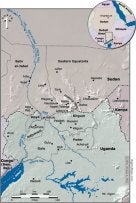| HRW Documents on Uganda | FREE Join the HRW Mailing List |
|
Uganda: Army and Rebels Step Up Attacks on Civilians |
(New York, October 29, 2002)
Both the rebel Lord’s Resistance Army (LRA) and Ugandan government forces have stepped up abuses against civilians in recent months, Human Rights Watch said today in a briefing paper on the war in northern Uganda.
The Ugandan government has responded to the increased LRA activity by ordering, on October 3, tens of thousands of people to leave their villages within forty-eight hours, and gather in towns and displacement camps. On October 6, the army started bombing the region that was to be evacuated. Local sources have reported that some civilians have died in the bombings. “Civilians are not simply caught in the crossfire of this war, but have become the primary focuses of LRA attacks,” said Jemera Rone, researcher in Human Rights Watch’s Africa division. “The government has also not taken the necessary precautions to protect civilians.” The current forcible relocation of civilians is likely to lead to further suffering of the civilian population. In 1996, the army forcibly displaced civilians in the name of security. Over half a million people have been living in camps under poor conditions ever since, where they have been subject to abuse by Ugandan government soldiers, but have also not been protected from LRA attacks. Even where the security of the civilians is at stake, or imperative military reasons require displacement, ‘all possible measures should be taken in order that the civilian population may be received under satisfactory conditions of shelter, hygiene, health, safety and nutrition,’” according to Protocol II of the Geneva Conventions. “The standards of the Geneva Conventions have clearly been violated by the Ugandan government,” Rone said. Civilians in northern Uganda and southern Sudan have suffered more attacks from the LRA—a rebel force with a very poor human rights record—in recent months. In March 2002, under pressure from the U.S. government, the Sudan government allowed the Ugandan army on its territory to launch a major offensive against the LRA, called “Operation Iron Fist.” The Sudanese government, which had supplied the LRA previously with food and equipment, also cut any support for the LRA. As the initial plan to eliminate the LRA failed, the rebels moved into the mountains in southern Sudan and into Uganda. Since May 2002, the LRA has increased its attacks in northern Uganda, abducting and killing civilians, and looting villages, camps for internally displaced persons, and Sudanese refugee camps. As of September 2002, an estimated 552,000 Ugandans were displaced or at risk of having no harvest, at least 24,000 Sudanese refugees in Uganda had been forcibly displaced, unknown thousands of southern Sudanese were displaced inside Sudan, and refugee and displaced persons camps and supplies had been looted or burned. Large numbers of civilians have been killed in this conflict since March 2002 in both northern Uganda and southern Sudan. |
